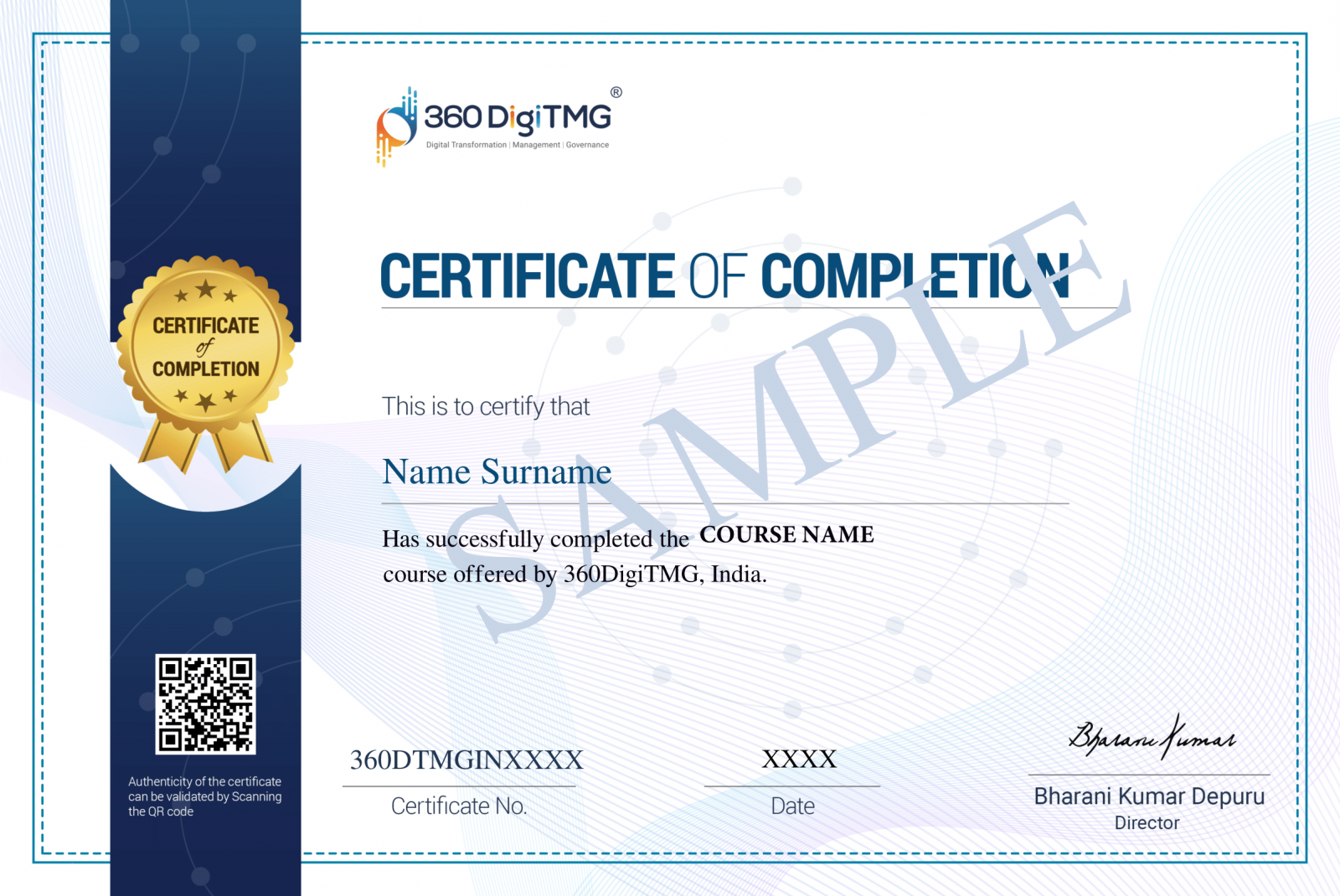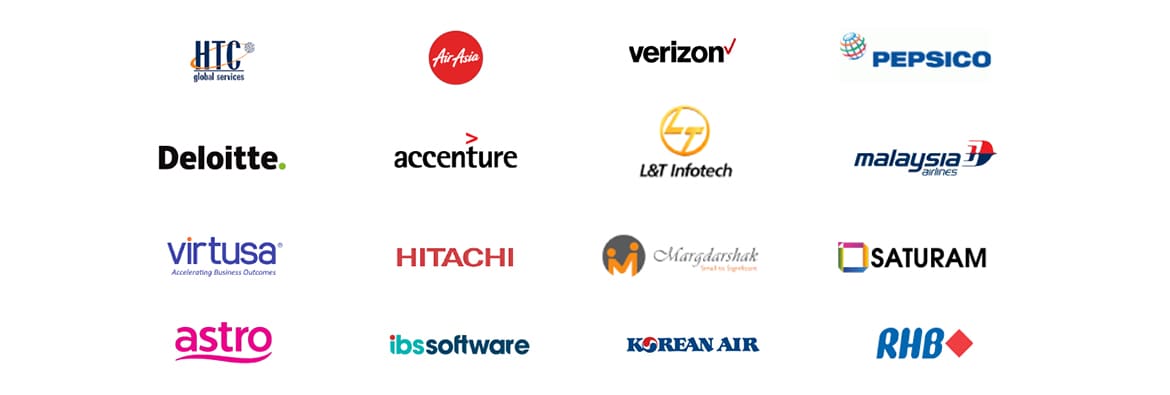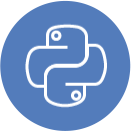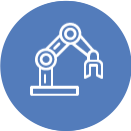Professional Certificate Course in
Workshop on IR 4.0 in India
- Get Trained by Trainers from ISB, IIT & IIM
- 16 Hours of Interactive Online Sessions
- Business Strategies in Implementing Industry 4.0
- Industry 4.0 Roadmap & Maturity Continuum
- Access to IR 4.0 Implementation Templates
3415 Learners
Academic Partners & International Accreditations
The Department of Heavy Industry (GoI) has launched its Industry 4.0 initiative titled Smart Advanced Manufacturing and Rapid Transformation Hub (SAMARTH)" - (Source). The industrial revolution is extremely relevant and has increasingly gained importance in the manufacturing industry for ample reasons. It is marked by advances in technologies like artificial intelligence (AI), augmented/virtual reality, big data, analytics, and the Internet of Things. When these technologies are used in the workplace, they give way to a fresh approach to create ways that add value to a business or an organization. The industrial revolution has also enabled the formation of digital ecosystems and promoted engagement with consumers on a large scale. IR4.0 has created opportunities for manufacturers to improve their operations and analyze the tremendous amount of data collected and identify patterns and insights to inform what needs attention. This course in India will expose you to the key technologies associated with Industry 4.0.
Industrial Revolution 4.0 Workshop Overview
Join the exclusive Industrial Revolution (IR) 4.0 workshop for decision-makers. Learn the implications of IR 4.0 for your business. Learn the various stages of industrial revolutions and understand the difference between IoT and IIoT. You will also learn how human-machine collaborative efforts are supported by the cloud. Explore Predictive Analysis, Big Data, and Automation, the compelling forces for Industry 4.0’s advancement. The workshop has been specially designed for mid to senior-level executives and IR 4.0 consultants to help them understand how to adapt businesses to IR 4.0. The two-day workshop lays down the principles and applications of IR 4.0 technologies. Decision-makers will learn about the challenges and best practices of IR 4.0 implementation from industry use cases. The workshop will empower them to make informed decisions while preparing implementation roadmaps for advanced technologies such as the Industrial Internet of Things, Cloud Computing, Big Data, Machine Learning, Artificial Intelligence, Cyber-Physical Systems, and Cognitive Computing.
Definition
A significant transformation of digitization in manufacturing is referred to as the fourth industrial revolution. The adoption of smart and autonomous systems powered by data and machine learning in manufacturing has brought this revolution. This smart factory is nothing but a combination of the Internet of Things and cyber-physical systems used to improve business, enable faster, more flexible processes to increase productivity and foster industrial growth. These digital technologies are changing the production dynamics between suppliers, producers, and customers.
IR 4.0 Workshop Learning Outcomes
The Industrial Revolution is very much driven by smart technology that has changed the engineering environment at a fast pace. The fourth industrial revolution has facilitated digitalization and integration of value chains, products and business models that offer significant value to organizations through tailored made solutions. The IR 4.0 has contributed to the amalgamation of the digital and physical world with a vision and concept in motion to enable autonomous decision-making processes, cutting the inefficiencies and monitoring assets. This course provides comprehensive coverage of the applications of IR 4.0 in the business world. You will gain deep insights into the various stages of industrial revolutions, explore the power of Cloud Computing in a networked economy, and acknowledge the smartness of major IR 4 systems. You will also learn about Cyber Systems from the Industrial Systems perspective and will understand Automation and Robotics, Augmented Reality and Virtual Reality, Big Data, and Analytics. Besides, students will learn the key skills required in the data analytics space and operating systems in IIoT deployments.
Block Your Time

16 hours
Live Sessions
Who Should Sign Up?
- Professionals
- IR 4.0 consultants
- Factory heads, Operations heads
- Senior executives
- Research and Development heads
- Manufacturing plant heads
Industrial Revolution 4.0 Workshop Modules
"Industry 4.0" is a combination of various innovations in digital technology that has transformed the manufacturing industry enabling a powerful way of running global operations. It has revolutionized production, processes, systems, logistics, and service provision resulting in short production cycles, instant responses to customer needs, and timely completion of orders because of smart production lines. Through these modules’ students will closely examine the full range and scope of factors driving IR 4.0 and its impact. Learn the application of IoT in industrial space and explore automation, cybersecurity, robotics, additive manufacturing, 3D printing, blockchain and augmented reality. You will also learn about the application, challenges, and best practices of IR 4.0. This workshop on IR 4.0 will provide a roadmap to implement IR 4.0 and find new avenues of growth.
Tools Covered









Trend in IR 4.0
We are in an era that is driven by technologies of data science, artificial intelligence, social media, cloud, and the Internet of Things. Technology trends that are going to be the building blocks of IR 4.0 describe how they can improve manufacturing productivity. Data collected from different sources like sensors in production equipment and management systems will be analyzed to support real-time decision making. Autonomous robots will be seen interacting with humans and display a greater range of capabilities. With horizontal and vertical integration between departments, functions, and companies will develop data-integration networks that will enable truly automated value chains. The Industrial Internet of Things will allow field devices to communicate and interact enabling real-time responses.
But this increased connectivity will also give rise to concerns regarding the need to protect critical systems and lines from cybersecurity threats. Therefore, secure and reliable access management of machines will become essential. Addictive manufacturing, such as 3-D printing, will be used to design and create complex customized products, lightweight designs. Augmented reality will be one trend to watch out for because it will provide services like selecting parts in a warehouse or sending instruction regarding repairs over digital devices that will in turn facilitate better decision making and work procedures. Companies who are embracing technology realize the potential of Industry4.0. So, attend the workshop IR4.0 and become a part of the changemaker’s rally.
How we prepare you
-
Realtime Use Case Scenarios

-
Live Free Webinars

-
Resume and LinkedIn Review Sessions

-
Lifetime LMS Access

-
24/7 Support

-
Job Placements in Industry 4.0 fields

-
Complimentary Courses

-
Unlimited Mock Interview and Quiz Session

-
Hands-on Experience in Live Projects

-
Offline Hiring Events

Call us Today!

Certificate
Show your preparedness to align your organisation to IR 4.0. The IR 4.0 for Decision-Makers Certification is a testament to your understanding of new technologies and how they can be applied to your business context.
Recommended Programmes
Data Science for Beginners using Python & R

 2064 Learners
2064 Learners
Big Data using Hadoop & Spark Course Training

 3021 Learners
3021 Learners
Artificial Intelligence (AI) & Deep Learning Course

 2915 Learners
2915 Learners
Alumni Speak

"The training was organised properly, and our instructor was extremely conceptually sound. I enjoyed the interview preparation, and 360DigiTMG is to credit for my successful placement.”
Pavan Satya
Senior Software Engineer

"Although data sciences is a complex field, the course made it seem quite straightforward to me. This course's readings and tests were fantastic. This teacher was really beneficial. This university offers a wealth of information."
Chetan Reddy
Data Scientist

"The course's material and infrastructure are reliable. The majority of the time, they keep an eye on us. They actually assisted me in getting a job. I appreciated their help with placement. Excellent institution.”
Santosh Kumar
Business Intelligence Analyst

"Numerous advantages of the course. Thank you especially to my mentors. It feels wonderful to finally get to work.”
Kadar Nagole
Data Scientist

"Excellent team and a good atmosphere. They truly did lead the way for me right away. My mentors are wonderful. The training materials are top-notch.”
Gowtham R
Data Engineer

"The instructors improved the sessions' interactivity and communicated well. The course has been fantastic.”
Wan Muhamad Taufik
Associate Data Scientist

"The instructors went above and beyond to allay our fears. They assigned us an enormous amount of work, including one very difficult live project. great location for studying.”
Venu Panjarla
AVP Technology
Our Alumni Work At

And more...
FAQs on Industry 4.0
In IR 3.0, computerisation and automation were considered important aids in improving productivity, and were given an enormous thrust. In IR 4.0, every process, machine and activity is broken down to the basic granular level and treated as a data point. Various measurement metrics are monitored for these data points to help in data-driven decision-making.
IR 4.0 is an ongoing process, with connectivity being the key. A business in this context must establish connection protocols for every machine in their ecosystem with the corporate network, which is fast and secure. Organisations must establish a clear cut plan of action with timelines to establish connectivity. As a next phase, a rigid signal capture and data storage system must be put in place. Data-driven decision-making models and protocols that can provide automated feedback to the system must be established. Training and sensitisation of employees towards the principles of IR 4.0, and software and hardware upgrades to meet the requirements of IR 4.0 connectivity are also important factors.
It enables easy backend integration with ERP/MES etc. It allows for various micro-services and the distribution of various functionalities to different nodes. 4.0 also makes resource management easy with transparent and monitored communication pathways. It is easy in this environment to add new protocols and processes as an additive measure. It is also possible to establish communications among various components and profit centres on the shop floor.
Lean manufacturing is an ongoing process of identifying wasteful practices, reducing costs and improving quality. Under the IR 4.0 paradigm, the focus is on connections among the various assets and nodes in an organisation. IR 4.0 architecture will eventually help achieve the goal of Lean.
Some of the key concerns that need to be addressed before moving to an IR 4.0 architecture are cyber security, handling an enormous volume of data, resource training and deployment, and very long ROI cycles that may lead to the company’s management pulling the plug midway.
The Internet of Things (IoT) is a term that stands for the connections of processes, people, data and devices over an IT network. IoT enables the connectivity of machines and equipment on the factory floor. It is an important component of Industry 4.0.
The Industrial Internet of Things (IIoT) is a term that stands for the Internet of Things (IoT) in an industrial environment. IIoT solutions are part of cyber-physical technologies that define the fourth Industrial Revolution. It encompasses additional solutions such as Additive Manufacturing, Digitisation of Business Processes and Advanced Control Systems.
Industry 4.0 solutions improve the efficiency, quality and utilisation of factory operations. Businesses across geographies have shown improved factory productivity and product quality, and reduced operating costs after adopting Industry 4.0 solutions. Simply put, Industry 4.0 helps manufacturers make more in less time, and with fewer resources.

Jobs in the field of Industry 4.0
Industry 4.0 involves creating smart factories and this is the right time to invest in a career in Industry4.0. You can work as an automated engineer, a digital manufacturing manager. Robotics Engineer, Equipment Systems Engineer, Controls Systems Engineer, etc.

Salaries in India for Industry 4.0
As industry 4.0 continues to gain importance by facilitating smart innovations to happen. It also impacts the salary section. The average salary of an industry 4.0 expert with 0-3 years of experience is between Rs6,00,000 to Rs 10,00,000 in India.

IR4.0 Projects in India
The digital transformation in the manufacturing and production industries was brought about by IR4.0. There are various projects in the manufacturing industry like managing assets. preventing overstocking, reducing cost, and using data analytics to streamline manufacturing and business operations.

Role of Open Source Tools in IR 4.0
Open source is driving industry 4.0 and its importance is recognized by manufacturers. The open-source hardware enables the sensors that represent every was in smart factories. The open-source software makes the data available to both people and machines.

Modes of Training for Industry 4.0
The course in India is designed to suit the needs of students as well as working professionals. We at 360DigiTMG give our students the option of online learning. We also support e-learning as part of our curriculum.

Industry Application of Industry 4.0
Accepting IR4.0 has facilitated digital manufacturing and has provided benefits of agility and flexibility to companies. This evolutionary technology can be used in analytics, IoT, advanced robotics, cloud computing, Additive manufacturing, Augmented, and virtual reality.
Companies That Trust Us
360DigiTMG offers customised corporate training programmes that suit the industry-specific needs of each company. Engage with us to design continuous learning programmes and skill development roadmaps for your employees. Together, let’s create a future-ready workforce that will enhance the competitiveness of your business.





Student Voices








 +91 9989994319
+91 9989994319














